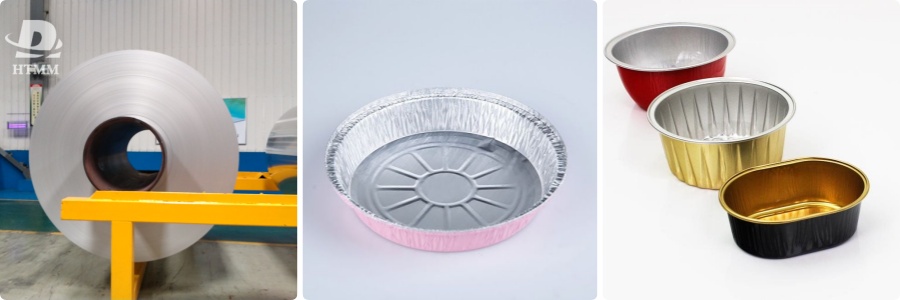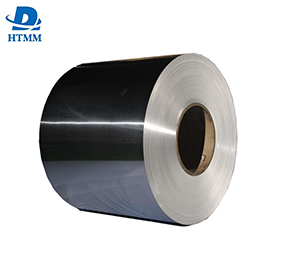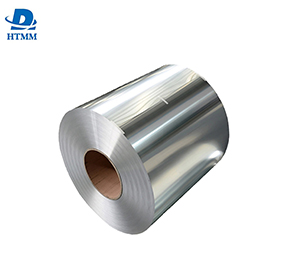This comprehensive discussion explores key performance advantages of foil containers compared to alternatives. Technical analysis is accompanied by practical case studies and consumer research demonstrating tangible impacts.
With a nuanced understanding of material capabilities and usage realities, businesses can reliably leverage aluminum foil's versatility. Our goal is empowering entrepreneurs through expertise and collaboration.

Space Efficiency:
Foil molds compactly to any shape,Forms nested, stackable cylinders, squares or custom profiles occupying minimal storage and transportation footprints per unit。 Enables higher yields from sheet processing versus rigid alternative materials prone to wasted scraps.
Airtight Sealing:
Ductile metal hugs tight contours to exclude oxygen and moisture that cause spoilage.Protects freshness on the move.Holds extended best-by dates when sealed properly compared to breather containers.
Thermal Insulation:
Highly reflective inner layer bounces radiant heat back toward contents,so that the food could retains ideal serving temperatures.Low mass compared to plastic or glass means less conductive heat transfer away from the food.
Real-world examples validate 60mic Aluminum Foil as a reusable, lightweight and secure packaging option supporting thriving industries. Our expertise enhances sustainability through innovative solutions.
As a leader in foil manufacturing, we are dedicated to developing sustainable products enabling thriving industries globally. One such solution benefiting food services is our proprietary jumbo roll aluminum foil tailored to on-demand container fabrication.
This comprehensive guide explores how our industrial-sized 60mic Aluminum Foil rolls streamline just-in-time container production. Key attributes are highlighted alongside real-world applications showcasing tangible impacts on operations.
Through understanding jumbo roll capabilities, businesses can leverage our experience advancing packaging efficiencies. Collaboration also aims to uncover untapped synergies between materials engineering and industry frontiers.
Reliable on-Demand Manufacturing
Jumbo rolls facilitate versatile on-premise container forming:
- Continuous rolls maintain consistent gauge and surface qualities essential for automated or manual processes.
- Diameters accommodate high-capacity winding systems required for busy production schedules without downtime.
- Widths allow single sheets to easily span commercial sized pans, trays or forms for rapid assembly of multiple items simultaneously.
Optimized Attributes
Enhanced functional lifetime drives cost efficiencies:
- Thickness maintains rigidity through high-speed fabrication operations without deformation.
- Surface reflectivity holds foods at optimal serving temperatures over extended shelf life between uses.
- Chemical resistance survives washing, sterilization and reheating cycles common to institutional kitchens.
Real-world examples showcase 8011 Food Grade Aluminium Foil For Container Making rolls' positive impacts on throughput, waste reduction and safety. Our expertise helps innovators channel material benefits into emerging opportunities.
Optimizing Food Packaging Solutions Through Specialized Alloy Innovation
We HTMM Aluminum Foil Manufacturer are dedicated to developing sustainable products through collaborative materials engineering. Our proprietary jumbo roll foil leverages optimized alloys and tempers to streamline on-demand container production.
we will explores the 8011 and 3003 alloy compositions tailored for high-volume thermoforming applications. Key attributes of the H18, H22 and H24 heat treatments are highlighted through real-world case studies demonstrating tangible impacts.
By understanding our alloy and temper selections, businesses can reliably leverage over 40 years of metallurgical experience. Our goal is empowering the food industry through customized solutions informed by applied materials science.
Tailored 8011 Food Grade Aluminium Foil For Container Making
.jpg)
Enhanced strength without compromising formability:
- Aluminum primary constituent for conductivity and recyclability
- 0.8% manganese increases work-hardening resistance
- 0.1% magnesium provides optimal precipitation hardening
3003 Alloy
Balanced rigidity and malleability:
- Aluminum base retains critical properties
- 1.2% manganese strengthens for impact resistance
- <0.1% other elements maintain corrosion resistance
Complementary Tempers
Optimized microstructure facilitates manufacturing:
- H18 soft temper improves deep drawability
- H22 semi-rigid temper enhances surface hardness
- H24 rigid temper retains dimensional stability
Case studies illustrate alloy/temper synergies streamline thermoforming while withstanding post-process exposures. Our expertise propels packaging sustainability through customized solutions for China Aluminium tray Manufacturers.
Lubrication: A Key Enabler of High-Speed Forming Processes
As a leader in specialty foil production, we are dedicated to solutions advancing sustainable industries globally. One such innovation is our proprietary lubrication process tailored for high-capacity thermoforming applications utilizing jumbo foil rolls.
This comprehensive guide explores how lubricants optimize aluminum's inherent workability for high-speed, complex shape manipulation. Key considerations around friction reduction, dimensional stability and throughput are analyzed through practical case studies.
With a deep understanding of materials science and engineering realities, businesses can leverage our expertise transforming manufacturing frontiers. Collaboration continuously evolves solutions through multi-faceted perspectives.
Reducing Friction
Lubricants facilitate intricate forming operations:
- Drawing: Enables smooth deep draws into complex curves and angles without cracking at rapid stroke rates.
- Flanging: Allows precise edge curling or flanging without deformation even under high- impact stamping pressures.
- Die Release: Lowers sticking between mating surfaces like tub inserts, easing removal and reducing assembly times.
Preserving Accuracy
Uniform film maintains dimensional consistency:
- Surface Tension: Micro-thin layer counteracts stresses encouraging predictable, repeatable dimensions batch over batch.
- Caliper Control: Uniform coating thickness avoids localized stretching or thinning that could imperil airtight seals.
Optimizing Throughput
Lubricants power higher efficiencies:
- Speed: Enables faster reciprocating motion and production speeds without workpieces clinging to dies.
- Uptime: Prevents processing halts from damaged goods, maximizing equipment utilization rates.
Our expertise enhances formability and sustainability through customized solutions informed by in-depth materials knowledge.
Ensuring Food Safety through Specialized Lubricant Selection
As a leader in foil manufacturing, ensuring material compatibility and regulatory compliance are top priorities. This involves choosing lubricants carefully to avoid contamination when aluminum foil contacts consumable products.
This comprehensive guide explores key attributes to consider when selecting a lubricant tailored for food-contact applications. Technical analysis is accompanied by real-world case studies and regulatory perspectives.
With a well-rounded understanding of materials science, chemistry and safety requirements, formers can leverage our expertise optimizing both production and public health. Collaboration also enhances knowledge to continuously progress solutions.
Chemical Composition
Food-grade lubricants must:
- Consist of FDA-approved, non-toxic substances like mineral oils, silicone derivatives or other GRAS ("generally recognized as safe") ingredients.
- Avoid additives like antioxidants, pigments or corrosion inhibitors that could potentially migrate into foods during storage or processing.
Resistance to Migration
Minimal leaching protects consumers:
- High-viscosity fluids resist absorption and maintain an imperceptible protective layer under manufacturing pressures and temperatures.
- Selecting those soluble in oil but insoluble in water limits migration potential into aqueous or acidic foods.
Regulatory Compliance
Strict adherence avoids recalls:
- NSF H1 registration verifies compliance to US and international food contact material standards.
- Kosher and halal certifications validate suitability for regulated food types.
Case studies highlight the importance of vetting suppliers' traceability, testing and safety management programs alongside formulation details. Our expertise enhances both efficiency and well-being.





